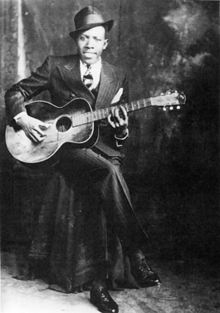
Back روبرت جونسون Arabic روبرت جونسون ARZ رابرت جانسون AZB Robert Johnson BAR Робэрт Лерой Джонсан BE-X-OLD Робърт Джонсън Bulgarian Robert Johnson Breton Robert Johnson Catalan Robert Johnson Czech Robert Johnson Danish
Robert Johnson | |
|---|---|
 Johnson in 1936 | |
| Background information | |
| Birth name | Robert Leroy Johnson |
| Born | May 8, 1911 Hazlehurst, Mississippi, U.S. |
| Died | August 16, 1938 (aged 27) Greenwood, Mississippi |
| Genres | Delta blues |
| Occupations |
|
| Instruments |
|
| Years active | 1929–1938 |
| Labels | Vocalion |
| Website | robertjohnsonbluesfoundation |
Robert Leroy Johnson (May 8, 1911 – August 16, 1938) was an American blues musician and songwriter. His singing, guitar playing and songwriting on his landmark 1936 and 1937 recordings has influenced later generations of musicians. Although his recording career spanned only seven months, he is recognized as a master of the blues, particularly the Delta blues style, and as one of the most influential musicians of the 20th century. The Rock and Roll Hall of Fame describes him as perhaps "the first ever rock star".[1]
As a traveling performer who played mostly on street corners, in juke joints, and at Saturday night dances, Johnson had little commercial success or public recognition in his lifetime. He had only two recording sessions both produced by Don Law, one in San Antonio in 1936, and one in Dallas in 1937, that produced 29 distinct songs (with 13 surviving alternate takes). These songs, recorded solo in improvised studios, were the sum of his recorded output. Most were released as 10-inch, 78 rpm singles from 1937–1938, with a few released after his death. Other than these recordings, very little was known of his life outside of the small musical circuit in the Mississippi Delta where he spent most of his time. Much of his story has been reconstructed by researchers. Johnson's poorly documented life and death have given rise to legends. The one most often associated with him is that he sold his soul to the devil at a local crossroads in return for musical success.
His music had a small, but influential, following during his life and in the decades after his death. In late 1938, John Hammond sought him out for a concert at Carnegie Hall, From Spirituals to Swing, only to discover that Johnson had recently died. Hammond was a producer for Columbia Records which bought Johnson's original recordings from Brunswick Records which owned them. Musicologist Alan Lomax went to Mississippi in 1941 to record Johnson, also not knowing of his death. In 1961, Columbia released an album of Johnson's recordings titled King of the Delta Blues Singers produced by legendary producer and music historian Frank Driggs. It is credited with finally bringing Johnson's work to a wider audience. The album would become influential, especially in the nascent British blues movement; Eric Clapton called Johnson "the most important blues singer that ever lived."[2] Bob Dylan, Keith Richards, and Robert Plant have cited both Johnson's lyrics and musicianship as key influences on their own work. Many of Johnson's songs have been covered over the years, becoming hits for other artists, and his guitar licks and lyrics have been borrowed by many later musicians.
Renewed interest in Johnson's work and life led to a burst of scholarship starting in the 1960s. Much of what is known about him was reconstructed by researchers such as Gayle Dean Wardlow and Bruce Conforth, especially in their 2019 award-winning biography[3] of Johnson: Up Jumped the Devil: The Real Life of Robert Johnson (Chicago Review Press). Two films, the 1991 documentary The Search for Robert Johnson by John Hammond Jr., and a 1997 documentary, Can't You Hear the Wind Howl?: The Life & Music of Robert Johnson, which included reconstructed scenes with Keb' Mo' as Johnson, attempted to document his life, and demonstrated the difficulties arising from the scant historical record and conflicting oral accounts. Over the years, the significance of Johnson and his music has been recognized by the Rock and Roll, Grammy, and Blues Halls of Fame, and by the National Recording Preservation Board.
- ^ Hill, Michael. "Robert Johnson". Rock and Roll Hall of Fame. Retrieved September 25, 2022.
- ^ LaVere 1990, p. 23, in essay by Eric Clapton.
- ^ Malt, Andy (May 12, 2020). "Robert Johnson Biography Takes Penderyn Music Book Prize". Completemusicupdate.com. Retrieved May 18, 2020.